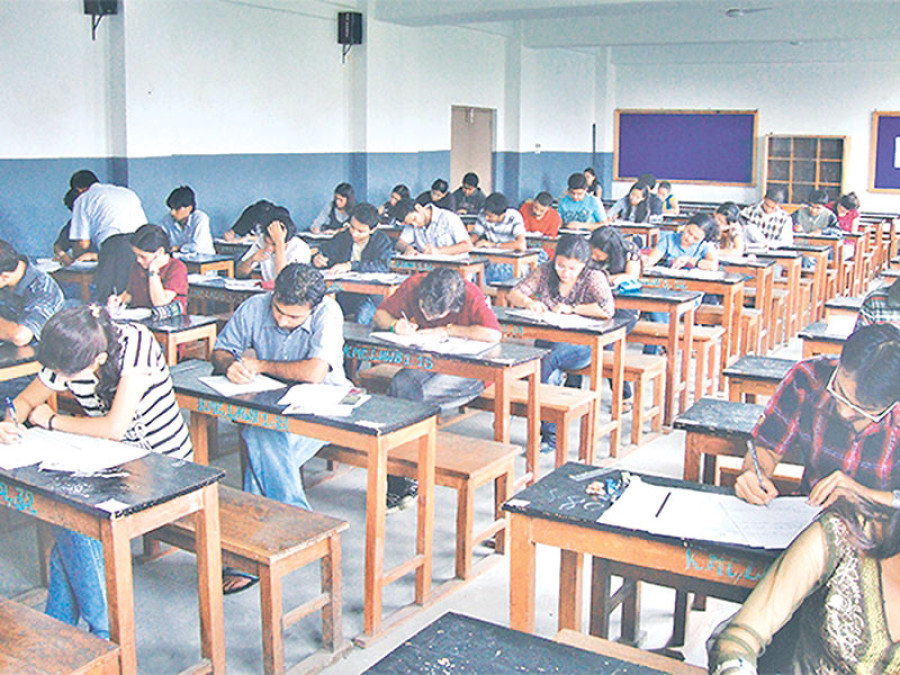Opinion
Reform school education
Formative assessment over summative assessment in schools is the need of the hour
Recently the Office of Controller of Examination (OCE) erroneously declared results of Secondary Education Examination (SEE). The moment was not only full of tension and unbearable for the candidates and respective parents but it was also embarrassing for all of us. Eventually, the OCE had to change results of almost 451, 532 candidates after its first announcement. According to the results, 435, 514 candidates were successful in the SEE in regular category of general education. Now, we witness that the SEE graduates have been in search of relatively improved schools for enrolling them in grade XI. Hence, it is a hard time for these students to choose the best school to have their aim treasured.
Nevertheless, 58, 688 students have been visibly barred to get the AAF as they scored Grade Point Average (GPA) from 0.8 and below 1.2. So, they are apparently declared as (un)successful candidates, and have been offered to re-sit in examinations. In fact, the OCE offered to those candidates, who obtained C grade or less than that can sit for re-examination on August 8 i.e. next month.
Except a few number of renowned schools, almost all schools like to indulge in unwanted bargaining in admissions with concerned parents. In a rush, ultimately many parents have to invest a substantial amount of budget to educate their wards. Besides this, the provision of admission procedures after the announcement of the SEE results costs a lots to parents as they earlier had to enroll their wards in bridge course centers for about two and half month.
Provisional enrollment
The Education Act and the Regulation confine grades IX to XII into secondary level. According to the constitution of Nepal, schools are managed and supervised under the authority of local governments. Thus, National Examinations Board (NEB) can allow schools to grant provisional enrollment for prospective students in grade XI as soon as their SEE is over. If it is provisioned, parents will find some respite from the anxiety they have.
Furthermore, students get enough time to enhance their standard in academics and other facets of life skills by getting early entry in the upper grade. It is imperative to provision to balance analogical privilege as like that of the prospective candidates of A-level and IB programs, who can enroll into the programs immediately after the SEE. It also automatically controls the manipulation of bridge course centers, which are less focused on enhancing knowledge and are more into profit making. In addition, the NEB is urgently expected to fix the quotas for admissions in various schools.
A bitter fact is that many schools have been admitting as many students as they can attract. They also keep about fifty students or more in a section in most cases. In this scenario, how can we anticipate quality education in grades XI and XII? attaining it will be almost difficult. Thus, amassing students needs immediate controlling. For this, the NEB is expected to supervise the schools in terms of the physical infrastructure and capabilities, ambience and location, teaching faculty, facilities of various laboratories and resources, and modern teaching-learning equipments.
It is indeed essential to look after the real track records of their academic enhancement along with the facilities of several disciplines that incorporate with co-curricular and extracurricular events and activities. Besides, if the NEB itself upgrades to conduct the Common Entrance Examination (CEE) for the SEE appeared candidates in each province in collaboration of local and provincial authorities, parents won’t have to purchase the AAF from various schools. It consequently appeases the suffering of parents for fulfilling the several procedures for admitting their kids into upper grade. In this case, they could obtain the CEE certificate, and directly go to the schools for enrolling their wards.
Holistic evaluation
The existing grading system in transferring digital marks into letter grading system does not advocate the standard of education. It needs to change scientifically. For this, the schools are to be undeniably authorised to apply the continuous evaluation system of students.
Acknowledging the fact that the most developed countries such as the US, Canada, Australia, the United Kingdom, and several other countries have proven this provision keeping in mind that a child matters for holistic evaluation and inspiration.
Regarding this provision, schools have to develop, and execute improved tools such as presentation skill, creative assignment to help students look beyond the curriculum, the critical thinking power in the subject matter and various project works.
However, the local unit of education division must stand in tiptoe to inspect and regularise such parameters persistently to get rid of possible manipulation and discrepancies. Hence, performances of students are to be evaluated almost forty to fifty percent internally through such tools and external examination is held for the rest of the weight of the academic courses. Let the concerned stipulation be displayed in results soon.
Niroula is the academic coordinator at GEMS School




 9.7°C Kathmandu
9.7°C Kathmandu









